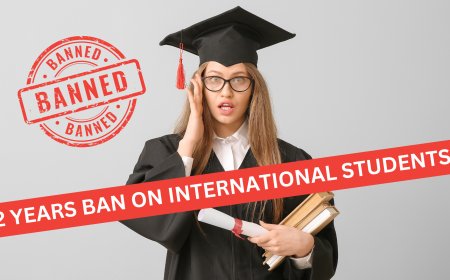Canada’s Visa Rules Trigger 35% Drop in Student Interest
Canada sees a 35% drop in international student interest amid visa cuts, policy changes, and housing issues, impacting enrolments and future growth prospects.

Interest in studying in Canada has dropped by 35%, according to Studyportals, an education platform based in Eindhoven, Netherlands. This decline follows the Canadian government's announcement in January about reducing the number of new international student visas. Studyportals shared exclusive data with University World News, showing a 35.3% decrease in interest among prospective international students from one year ago.
This drop mirrors the 35% reduction in international student visas set for 2024, as announced by Marc Miller, Canada's Minister of Immigration, Refugees and Citizenship. The decline affects both undergraduate and graduate programs, with bachelor’s programs seeing a 23.5% drop and master’s programs experiencing a sharper 36.7% decrease.
Studyportals' data, which tracks page views from potential students, is considered a reliable indicator of enrollment trends for the next 12-24 months. This data was released the same week Miller revealed an additional 10% cut in international visas over the next two academic years, leading to a total reduction of nearly 240,000 visas by 2026.
Miller also announced that graduate students, previously exempt from visa caps, would now be subject to these restrictions. Eligibility for post-graduate work permits and spousal work visas will also become more limited.
Edwin van Rest, President of Studyportals, commented on the situation, noting that the changes in Canada’s visa policies, delays in processing, and negative messaging around international students are clearly deterring students from coming. He emphasized that the consequences could extend beyond the intended scope of the visa cap, even affecting master’s and PhD students.
With the growing number of study opportunities in regions like Europe and Asia, students are reconsidering Canada as a destination, opting for countries with more welcoming policies, van Rest added.
A Shift in Canada’s Immigration Policy
Canada's current visa policies mark a significant departure from just a few years ago. In 2023, the country accepted 471,771 permanent residents and over a million international students. However, a September poll by Nanos Research showed that 55% of Canadians favored reducing the intake of international students, largely in response to the ongoing housing crisis.
Professor Mike Moffatt from the Ivey School of Business noted that international students are exacerbating housing shortages, especially in smaller cities where university-provided accommodation is limited. Single-family homes are increasingly being converted into student rentals, driving up housing costs for local residents.
Economic Over Education
Canadian universities and colleges have prioritized international student recruitment not for educational reasons, but to offset provincial funding cuts. These institutions have relied on the higher tuition fees paid by international students to fill their budget gaps.
David Robinson, executive director of the Canadian Association of University Teachers, highlighted the heavy reliance on international students at institutions like Cape Breton University, where over 7,000 of the 9,000 students are from abroad. These students pay significantly higher fees compared to domestic students.
Robinson argued that international student recruitment has shifted from an educational focus to a purely financial one. He urged universities to consider how these students contribute to the educational mission, rather than merely boosting revenue.
Declining Enrollment Factors
Final enrollment numbers for fall 2024 are still pending, but early data suggests Canada may not meet its target of 291,914 new international visas. Several factors contribute to the larger-than-expected decline in student numbers.
First, financial requirements for obtaining a student visa doubled to CA$20,650 in January. Additionally, delays in visa processing have caused backlogs, particularly due to the introduction of provincial attestation letters, which confirm that institutions have space for incoming students. Lastly, political tensions with India, one of the largest sources of international students, have also reduced demand.
Potential for Further Restrictions
While Miller did not announce new restrictions in a recent interview, concerns about asylum claims by international students, like the case of Muhammad Shahzeb, may lead to future changes in visa policies. The Canadian government aims to manage international student numbers sustainably while addressing potential misuse of the system.
Lessons for the Future
What's Your Reaction?
 Like
0
Like
0
 Dislike
0
Dislike
0
 Love
0
Love
0
 Funny
0
Funny
0
 Angry
0
Angry
0
 Sad
0
Sad
0
 Wow
0
Wow
0








































































